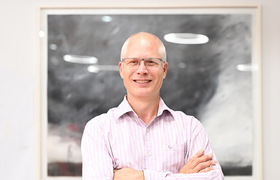Undergraduate Teaching and Learning at UCT First Semester 2021
07 December 2020 | DVC A/Prof Lis Lange
Dear students and colleagues,
University of Cape Town (UCT) staff and students have managed well with emergency remote teaching, but we know this is not the ideal way for us all to work. Congratulations to all who have persevered despite the unique challenges that 2020 brought.
The progressive opening of UCT campuses relies on everyone, staff and students, to exercise joint responsibility to take care of each other and to obey health directives to avoid the spread of the virus at the university. We all rely on your personal sense of responsibility and solidarity to follow health directives and to remind others to do the same.
It is understandable that you may have questions about how UCT will function during the first semester of 2021, particularly in light of the high likelihood of the increased spread of the COVID-19 pandemic in South Africa. We are currently witnessing the impact of “super-spreader” events at several South African universities, and naturally we want to ensure that UCT students and staff remain healthy and safe from infection as far as possible.
At the Senate meeting of Friday, 21 November, we made a number of decisions related to the 2021 academic year. I share these with you as it relates to my portfolio as Deputy Vice-Chancellor: Teaching and Learning.
Thank you very much to everyone who has been involved in helping us come to these decisions. Staff and colleagues have worked incredibly hard to allow us to continue our academic work despite very challenging circumstances.
Teaching and learning
All undergraduate UCT students who are resident in South Africa, and all international students who can return to South Africa, are expected to be in Cape Town for the start of the academic year on 15 March 2021. (Students in the Faculty of Health Sciences will need to be here earlier.)
During the first semester of 2021, UCT will offer all undergraduate courses in a physically distanced learning (PDL) mode. In practice this means:
- All undergraduate lectures will be offered online, with the exception of courses in the performing and creative arts, architecture and the languages.
- Faculties will be able to exercise their discretion in offering contact lectures for final-year courses, depending on the capacity of available venues.
- The Faculty of Health Sciences will manage its various programmes through a combination of online lectures and PDL in laboratories and on the clinical platform, according to COVID-19 health protocols.
- Laboratory and studio work will be organised to offer sessions both in the mornings and the afternoon, to accommodate everyone while allowing for physical distancing.
- Face-to-face tutorials will be provided according to faculties’ capabilities and the availability of approved venues. This means that students will be asked to come to campus on a rotation basis to attend tutorials.
- Fieldwork and internships will be accommodated to comply with both the needs of the different programmes and COVID-19 health protocols. Faculties will communicate the details directly to their students.
Volume of work, exams and academic rules
Students’ workload volume will go back to the pre-COVID demand of 45 hours per week. Special accommodation might be made at the discretion of the faculty when it is considered necessary.
All academic rules will be operating as per normal. Faculty Examinations Committees and Readmissions Committees will be duly constituted.
All courses will be assessed as required by departments. Results will be shown as grades and will contribute to the calculation of grade point averages from course level 1000 to exit level courses.
Space and university services
Sessions that involve physical contact, whether in a laboratory, studio, tutorial or final-year lecture, will be held under strict health protocols. Students and staff members not wearing masks will not be allowed into a venue. On registration, students will need to sign a commitment of adherence to COVID-19 health and safety protocols before being allowed on campus.
UCT will identify study spaces on campus that meet health protocols for the use of day students. These will be announced before the end of the year and again at the beginning of the academic year.
Computer laboratories that are serviced by Information and Communication Technology Services will be opened for the use of undergraduate students, following strict health protocols and cleaning rotation schedules. Faculty-managed undergraduate computer laboratories will follow the same protocols.
UCT Libraries will open for staff and registered students according to approved health protocols, staffing, spatial layout and seating capacity at the different library sites. The comprehensive Virtual Library Services will continue, and on-site services and facilities will be adapted to support the 2021 Teaching and Learning programme.
Residences space will be allocated according to the existing policy, which gives priority to minors, first-year and financial-aid students. There will be no shared accommodation. Physical distance and health protocols will be applied and students in residence accommodation will need to sign a commitment of adherence to COVID-19 health and safety protocols.
We will communicate with you the details of courses, timetables and venues when they have been finalised, soon after the beginning of 2021. The details of your specific courses will be communicated to you through your faculty.
Special communication about enrolment and registration for the academic year 2021 will be sent by the Office of the Registrar.
I trust in your ability to take care of yourself and all the members of the UCT community by following these directives. I wish you a successful exam season and a restful holiday to prepare you for a productive and enjoyable 2021.
Thank you again for your hard work, commitment and support.
Sincerely
Associate Professor Lis Lange
Deputy Vice-Chancellor: Teaching and Learning
Read previous communications:
 This work is licensed under a Creative Commons Attribution-NoDerivatives 4.0 International License.
This work is licensed under a Creative Commons Attribution-NoDerivatives 4.0 International License.
Please view the republishing articles page for more information.









